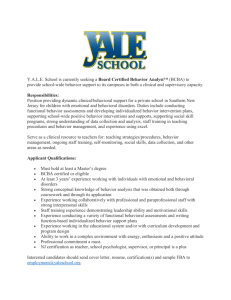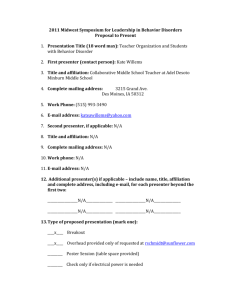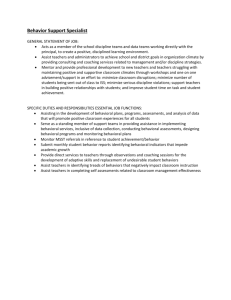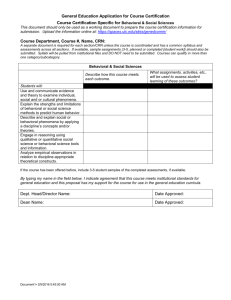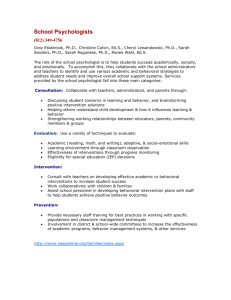SPED 305
advertisement
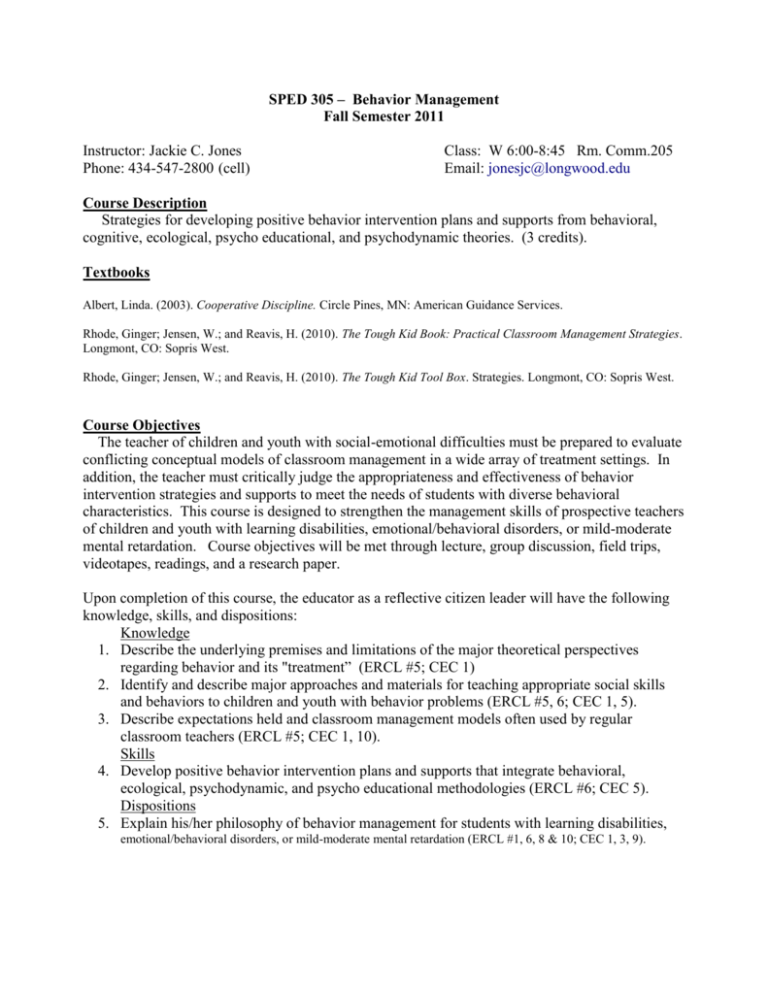
SPED 305 – Behavior Management Fall Semester 2011 Instructor: Jackie C. Jones Phone: 434-547-2800 (cell) Class: W 6:00-8:45 Rm. Comm.205 Email: jonesjc@longwood.edu Course Description Strategies for developing positive behavior intervention plans and supports from behavioral, cognitive, ecological, psycho educational, and psychodynamic theories. (3 credits). Textbooks Albert, Linda. (2003). Cooperative Discipline. Circle Pines, MN: American Guidance Services. Rhode, Ginger; Jensen, W.; and Reavis, H. (2010). The Tough Kid Book: Practical Classroom Management Strategies. Longmont, CO: Sopris West. Rhode, Ginger; Jensen, W.; and Reavis, H. (2010). The Tough Kid Tool Box. Strategies. Longmont, CO: Sopris West. Course Objectives The teacher of children and youth with social-emotional difficulties must be prepared to evaluate conflicting conceptual models of classroom management in a wide array of treatment settings. In addition, the teacher must critically judge the appropriateness and effectiveness of behavior intervention strategies and supports to meet the needs of students with diverse behavioral characteristics. This course is designed to strengthen the management skills of prospective teachers of children and youth with learning disabilities, emotional/behavioral disorders, or mild-moderate mental retardation. Course objectives will be met through lecture, group discussion, field trips, videotapes, readings, and a research paper. Upon completion of this course, the educator as a reflective citizen leader will have the following knowledge, skills, and dispositions: Knowledge 1. Describe the underlying premises and limitations of the major theoretical perspectives regarding behavior and its "treatment” (ERCL #5; CEC 1) 2. Identify and describe major approaches and materials for teaching appropriate social skills and behaviors to children and youth with behavior problems (ERCL #5, 6; CEC 1, 5). 3. Describe expectations held and classroom management models often used by regular classroom teachers (ERCL #5; CEC 1, 10). Skills 4. Develop positive behavior intervention plans and supports that integrate behavioral, ecological, psychodynamic, and psycho educational methodologies (ERCL #6; CEC 5). Dispositions 5. Explain his/her philosophy of behavior management for students with learning disabilities, emotional/behavioral disorders, or mild-moderate mental retardation (ERCL #1, 6, 8 & 10; CEC 1, 3, 9). Non-content Objectives and Competencies 1. Use appropriate written communication skills in terms of vocabulary, grammar, spelling and sentence construction. 2. Use appropriate verbal communication skills in terms of fluency of expression, grammar and appropriate active listening skills. 3. Use appropriate social skills in terms of monitoring their own behavior and the perceptions of others related to their behaviors. 4. Use communication skills in formal and simulated presentations. Class Schedule Topic Assignment Introduction & Overview Three-Tier Model of Behavior 8/31 & 9/1 The Basics of Behavior: Choice & The Need to Belong Albert, Ch. 1-2 The Four Goals of Misbehavior Albert, Ch. 3 9/7 & 8 Characteristics of Attention Seeking Preventions and Interventions Albert, Ch. 4-5 9/14 & 15 Learning Team Assignment: Role Plays 9/21 & 22 Characteristics of Power & Revenge Seeking Behavior Albert, Ch. 6-7 Defusing Confrontations - Power or Revenge: Interventions Albert, Ch.8-9 9/28 & 29 More About Revenge Seeking Behaviors Albert, Ch.10 Characteristics of Avoidance-of-Failure Behavior Albert, Ch. 11-12 Interventions 10/5 & 6 Setting the Tone Albert, Ch. 13-15, and 18 10/12 & 13 Test 1 10/19 & 20 The Tough Kid Rhodes, Ch. 1 What does he/she look like? The Critical Role of Classroom Management Rules and procedures ` 10/26 & 27 Unique Positive Procedures Rhodes, Ch. 2 About Disciplinary Intervention Teacher-Student Relationships 11/2 & 3 Reductive Techniques Rhodes, Ch. 3 Mental Set The student’s Responsibility 11/9 & 10 Advanced Systems Rhodes, Ch. 4 Getting Off to a Good Start Management at the School Level 11/16 & 17 School Action Plan Due 11/23 &24 Holiday – No class 11/30 & 12/1 Management at the School Level Rhodes, Ch. 5 Mainstreaming and Inclusion Research Paper Due Date 8/24 & 25 12/7 & 8 Final Exam Course Requirements 1. Tests. Students will complete one Test and one cumulative exam covering class activities, notes and all text readings. 2. Research paper. Students will complete a research paper on one of the following three topics: 1.) Life Space Crisis Intervention; 2.)Reality Therapy/Choice Theory; 3.)Cognitive Restructuring: Rational Emotive Behavior Therapy. We will "sign up" for the topics in class and only 6-10 students may choose any given topic. Papers will have three sections: one thoroughly describing the model, one giving information regarding research on the effectiveness of the model, and one explaining why you do or do not feel comfortable accepting all or parts of the model into your personal philosophy for dealing with the behavioral/social-emotional problems of children and youth with learning disabilities emotional/behavioral disorders, or mild-moderate mental retardation. Papers will be in APA 6th Ed. style, double-spaced, typewritten, approximately 5-8 pages, and free from errors. Papers are due on November 30th/December 1st and are worth 15% of your overall grade. Papers will be graded according to the following criteria: Technical Adequacy On time Typewritten and free from grammar/spelling errors A minimum of five references in APA style (in reference list at end of paper and also cited in APA style in body of paper) Content of Paper: Three Sections Thorough description of model Information regarding effectiveness Rationale for accepting/rejecting 3 points 5 points 5 points 10 points 3 points 4 points 3. School Action Plan Each student is expect to complete a Cooperative Discipline School Action Plan. The students will pinpoint and describe the student’s behavior, determine the goal for that behavior, select an intervention to stop the behavior, select encouragement strategies, develop plans to involve parents, students, and other partners and include a “Tool” model.This assignment is due November 16/17, 2011. 4. Student Participation Each student is expected to participate in both Learning Team Activities: Role Playing throughout the course and class discussions. The students will have an opportunity to respond to the Four Goals of Misbehavior with the goal being to correctly identify the goal of the behavior, engage in an appropriate intervention, and discuss and receive feedback with regards to the role play scenario 5. Grading (The final grade scale is: 95-100 =A, 89-94=B, etc. Uniform Program Policy) Assignment 1 Test Research Paper School Action Plan Participation Attendance Final Exam Date Due See syllabus 12/ 1/10 11/03/10 Rolling Rolling Exam Week Points 20% 15% 15% 15% 10% 25% 6. Attendance Students are expected to attend all class sessions. If you must be absent for legitimate purposes (i.e., death in the family or a recognizable illness or emergency), notify the instructor before the class session in question if possible. Late work will not be accepted without prior approval from the instructor and reasonable justification for lateness. A grade of "F" may be assigned if you miss more than 25% of the class sessions for any combination of excused or unexcused absences. If you miss more than 10% of the class sessions for unexcused absences, your grade may be lowered by one letter. 7. Honor Code Students are expected to abide by the Longwood College Honor Policy. All tests and assignments are to be pledged. 8. Disability Policy Please inform the instructor immediately if you require modifications in instruction or testing according to a disability plan filed with the Academic Support Center. Suggested Reading List Beyond Behavior (Special Issue) (2001). 10(3), 6-34 (a series of 5 short articles on service learning for students with E/BD). Cullinan, D. (2002). Students with emotional and behavior disorders: An introduction for teachers and other helping professionals. Upper Saddle River, NJ: Merrill-Prentice Hall. Cullinan, D., Osborn, S., & Epstein, M.H. (2004). Characteristics of emotional disturbance among female students. Remedial and Special Education, 25, 276-290. Curwin, R.L., & Mendler, A.N. (1999). Discipline with dignity. Upper Saddle River, NJ: Pearson. Duckworth, S., et al. (2001). Wraparound services for young schoolchildren with emotional and Behavioral disorders. Teaching Exceptional Children, 33(4), 54-60. Jones, V. (2002). Creating communities of support: The missing link in dealing with student Behavior problems and reducing violence in school. Beyond Behavior, 11(2), 16-19. Katsiyannia, A., & Smith, C.R. (2003). Disciplining students with disabilities: Legal trends and the issue of interim alternative education settings. Behavioral Disorders, 28 (4), 410-418. Kerr, M.M., & Nelson, C.M. (2002). Strategies for addressing behavior problems in the Classroom(4th ed.). Upper Saddle River, NJ: Merrill/Prentice Hall. Lewis, T.J., Hudson, S., Richter, M., & Johnson, N. (2004). Scientifically supported practices in emotional and behavioral disorders: A proposed approach and brief review of current practices. Behavioral Disorders, 29, 247-259. Long, N.J., Wood, M.M., & Fescer, F.A. (2001). Life space crisis intervention: Talking with students in conflict (2nd ed.). Austin, TX: Pro-Ed. Marzano, Robert. (2009) A Handbook for Classroom Management that Works. Upper Saddle River, New JerseyMerrill/Pearson. Meese, R.L. (1996). Strategies for teaching students with emotional and behavioral disorders. Pacific Grove, CA: Wadsworth/Brooks Cole. Montgomery, D.J. (2005). Communicating without harm: Strategies to enhance parent-teacher communication. Teaching Exceptional Children, 37 (5), 50-55. Pavri, S. (2001). Loneliness in children: How teachers can help. Teaching Exceptional Children, 33(6), 52-58. Ryan, J.B., & Peterson, R.L. (2004). Physical restraint in school. Behavioral Disorders, 29 (2), 154-168. Schoen, S.F., & Nolen, J. (2004). Action research: Decreasing acting-out behavior and increasing learning. Teaching Exceptional Children, 37 (1), 26-29. Snider, V.E., Busch, T., & Arrowood, L. (2003). Teacher knowledge of stimulant medication and ADHD. Remedial and Special Education, 24(1), 46-56. Sprick, R., Booher, M., & Garrison, M. (2009). Behavioral Response to Intervention: Creating a continuum of problem-solving & support. Eugene, OR: Northwest Publishing, Sridhar, D., & Vaughn, S. (2000). Bibliotherapy for all: Enhancing reading comprehension, selfconcept, and behavior. Teaching Exceptional Children, 33(2), 74-82. Wolfgang, C.H. (2001). Solving discipline and classroom management problems: Methods and models for today’s teachers (5th ed.). New York, NY: John Wiley & Sons. Zirpoli, T.J. (2005). Behavior management: Applications for teachers (4th ed.). Upper Saddle River, NJ: Pearson. Rubric for SPED 305 Research Papers Name___________________________________________________ Topic____________________________________________________ I. Technical Adequacy On time Typewritten and free from grammar/spelling errors A minimum of five references in APA style (in reference list at end of paper and also cited in APA style in body of paper) II. Content of Paper: Three Sections Thorough description of model 3 points 5 points 5 points 10 points Information regarding effectiveness 3 points Rationale for accepting/rejecting 4 points Total Points _______/30 Converted to a Letter Grade 27/30=90=AComments: SPED 305 Research Paper Topics Please put your name, your local telephone and e-mail under your chosen topic: Life Space Crisis Intervention Name 1. 2. 3. 4. 5. 6. Local Telephone and e-mail Reality Therapy/Choice Theory Name Local Telephone and e-mail 1. 2. 3. 4. 5. 6. Cognitive Restructuring: Rational-Emotive Behavior Therapy Name Local Telephone and e-mail 1. 2. 3. 4. 5. 6.

